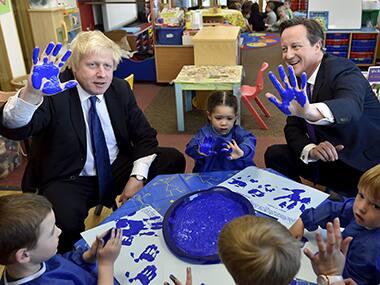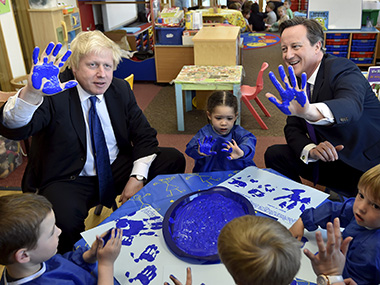British Prime Minister David Cameron appeared poised to remain in power Friday, with early British election results and exit polls indicating his Conservatives had won a resounding victory and will return to 10 Downing Street in a stronger position than before. Here are five things to take away from the UK elections. Conservatives look to be winners in surprise UK election Prime Minister David Cameron has easily won his Witney seat in southern England, and stopped just short for declaring overall election victory for his Conservatives. He told voters “this is clearly a very strong night for the Conservative Party.” [caption id=“attachment_2234802” align=“alignleft” width=“380”]
 Britain’s Prime Minister David Cameron (R) and London Mayor Boris Johnson (L). AP[/caption] Results seem to support an exit poll’s prediction the Tories will be the biggest seat in the House of Commons and may even win a majority of seats. A Conservative-led government would face a divided Britain, with the pro-independence Scottish National Party holding almost all the seats north of the border. Cameron has vowed to counter the rise of Scottish nationalism with more powers for Scotland and Wales within the United Kingdom. He says “I want my party, and I hope a government that I would like to lead, to reclaim a mantle that we should never have lost — the mantle of one nation, one United Kingdom.” Guess who’s back, back again! Boris Johnson has once again won his seat in Parliament He’s back. London Mayor Boris Johnson has once again won a seat in parliament, this time representing voters in the Uxbridge and Ruislip South district, as Conservative Party candidates did much better than expected in Britain’s election. The shaggy-haired mayor, seen as a possible future Conservative Party leader, had previously represented Henley. “The people of Britain, after a long and exhausting campaign, have finally spoken,” he said early Friday. “They have decisively rejected any attempt to take this country back to the 1970s. They want us to go forward with the sensible, moderate policies that have led to a sustained economic recovery.” Johnson will do both jobs until voters choose a new London mayor in 2016. Nick Clegg hangs on to Parliament seat while Party, Liberal Democrats, suffers worst defeat in years Liberal Democrat Party leader Nick Clegg managed to hang on to his seat in Parliament when results were announced Friday morning, but admitted that his party had suffered a terrible string of setbacks in Britain’s general election. The party that had been the junior partner in a Conservative-led government lost most of its seats. An exit poll suggested it would win perhaps 10 of the 650 seats in the House of Commons — down from 56 — and several major party figures were ousted by voters. After his own win, a woeful Clegg said “It is now painfully clear this has been a cruel and punishing night for the Liberal Democrats.” Clegg, who has served as the UK’s deputy prime minister for the last five years, hinted that he would be discussing his party leadership with colleges later Friday. SNP emerges as the party with the third biggest majority and wins the most number of seats in Scottish All seats in Scotland have been counted in Britain’s latest vote, making clear the scale of the landslide by the Scottish National Party, which captured 56 of the region’s 59 seats. That was a gain of 50 seats over the nationalists’ previous six seats in the 650-seat House of Commons. The opposition Labour Party lost 40 seats in Scotland. The result left the Conservatives, Labour and the Liberal Democrats with just one seat each in Scotland. UKIP leader Farage fails to win seat The United Kingdom Independence Party leader, Nigel Farage, has lost his bid to win a seat in Parliament and could resign despite his right-wing party’s surge to third in the popular vote nationwide. Farage finished second to Conservative Party candidate Craig Mackinlay, a former UKIP activist, in the South Thanet constituency east of London as results were announced Friday. Before the result, Farage had pledged to quit as UKIP leader if he failed to win the seat. He decried the British electoral system’s use of winner-takes-all constituencies. UKIP received nearly 3.8 million votes, but finished second or third in dozens of districts. Farage said before the result: “The system is bust. You’ve got a first-past-the-post system where we clearly become the third party in Britain but get hardly any seats.” AP
Britain’s Prime Minister David Cameron (R) and London Mayor Boris Johnson (L). AP[/caption] Results seem to support an exit poll’s prediction the Tories will be the biggest seat in the House of Commons and may even win a majority of seats. A Conservative-led government would face a divided Britain, with the pro-independence Scottish National Party holding almost all the seats north of the border. Cameron has vowed to counter the rise of Scottish nationalism with more powers for Scotland and Wales within the United Kingdom. He says “I want my party, and I hope a government that I would like to lead, to reclaim a mantle that we should never have lost — the mantle of one nation, one United Kingdom.” Guess who’s back, back again! Boris Johnson has once again won his seat in Parliament He’s back. London Mayor Boris Johnson has once again won a seat in parliament, this time representing voters in the Uxbridge and Ruislip South district, as Conservative Party candidates did much better than expected in Britain’s election. The shaggy-haired mayor, seen as a possible future Conservative Party leader, had previously represented Henley. “The people of Britain, after a long and exhausting campaign, have finally spoken,” he said early Friday. “They have decisively rejected any attempt to take this country back to the 1970s. They want us to go forward with the sensible, moderate policies that have led to a sustained economic recovery.” Johnson will do both jobs until voters choose a new London mayor in 2016. Nick Clegg hangs on to Parliament seat while Party, Liberal Democrats, suffers worst defeat in years Liberal Democrat Party leader Nick Clegg managed to hang on to his seat in Parliament when results were announced Friday morning, but admitted that his party had suffered a terrible string of setbacks in Britain’s general election. The party that had been the junior partner in a Conservative-led government lost most of its seats. An exit poll suggested it would win perhaps 10 of the 650 seats in the House of Commons — down from 56 — and several major party figures were ousted by voters. After his own win, a woeful Clegg said “It is now painfully clear this has been a cruel and punishing night for the Liberal Democrats.” Clegg, who has served as the UK’s deputy prime minister for the last five years, hinted that he would be discussing his party leadership with colleges later Friday. SNP emerges as the party with the third biggest majority and wins the most number of seats in Scottish All seats in Scotland have been counted in Britain’s latest vote, making clear the scale of the landslide by the Scottish National Party, which captured 56 of the region’s 59 seats. That was a gain of 50 seats over the nationalists’ previous six seats in the 650-seat House of Commons. The opposition Labour Party lost 40 seats in Scotland. The result left the Conservatives, Labour and the Liberal Democrats with just one seat each in Scotland. UKIP leader Farage fails to win seat The United Kingdom Independence Party leader, Nigel Farage, has lost his bid to win a seat in Parliament and could resign despite his right-wing party’s surge to third in the popular vote nationwide. Farage finished second to Conservative Party candidate Craig Mackinlay, a former UKIP activist, in the South Thanet constituency east of London as results were announced Friday. Before the result, Farage had pledged to quit as UKIP leader if he failed to win the seat. He decried the British electoral system’s use of winner-takes-all constituencies. UKIP received nearly 3.8 million votes, but finished second or third in dozens of districts. Farage said before the result: “The system is bust. You’ve got a first-past-the-post system where we clearly become the third party in Britain but get hardly any seats.” AP
Five things to takeaway from the 2015 UK elections
FP Archives
• May 8, 2015, 15:51:32 IST
Prime Minister David Cameron has easily won his Witney seat in southern England, and stopped just short for declaring overall election victory for his Conservatives.
Advertisement
)